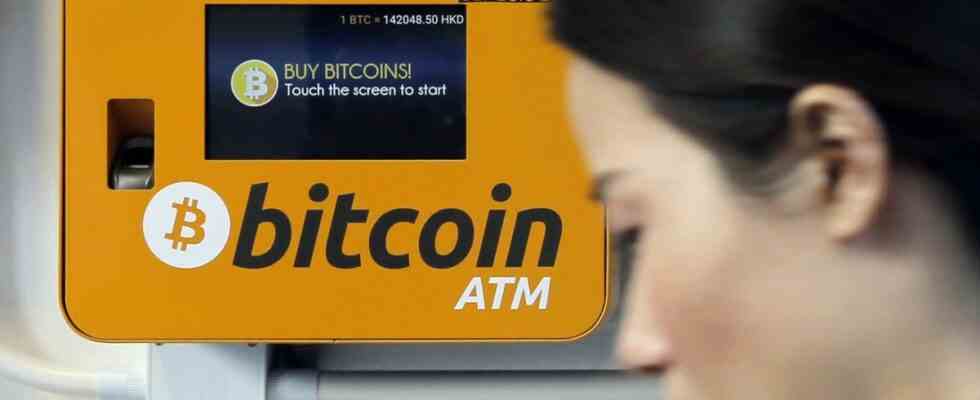That is already contradictory: It was not until mid-June that the world experienced the last major crypto crash for the time being; Bitcoin, Ether and other digital currencies lost massively in value. The US crypto exchange Coinbase is now deep in the red and the Berlin digital bank Nuri is bankrupt. The financial regulator Bafin warned earlier this year not for the first time insistent on the risk involved in buying cryptocurrencies. Irrespective of this, the number of machines in Germany where you can buy bitcoins with cash is growing relatively quickly. And these machines are now also available from retailers such as Saturn and Rewe.
Electronics retailer Saturn started things off in June, setting up vending machines in three of Germany’s busiest pedestrian zones, in Dortmund, Cologne and Frankfurt. The “new service” is well received, says a spokeswoman. There is also a Bitcoin machine in the supermarket of the independent Offenbach Rewe merchant Can Güler. Güler writes on social media that you can not only buy groceries from him, but “even invest locally”. A Rewe spokesman said that the independent Rewe retailers were “of course free to make their decisions”.
It is not clear how many Bitcoin ATMs there are in Germany. According to its own statements, the Bafin does not approve each individual machine, but rather grants permission to the operators. The operator at Saturn and Rewe is the Austrian start-up Kurant, which calls itself the European market leader and claims to have more than 40 Bitcoin machines in Germany alone.
The barriers to entry are very low
Bernd Richter, payment expert at the financial service provider FIS, puts the total number of crypto-ATMs in Germany at almost 100, worldwide there are 39,000, 32,000 of them in the USA alone. “Most of the machines in Germany are currently in pawnshops and arcades.” says Judge. “The operators now want to get out of the dirty corner and win brands that they trust.” The fees are between five and 20 percent and “are very attractive for providers”. According to managing director Stefan Grill, Kurant charges a fee of eight percent in Germany.
In order to buy bitcoin at a vending machine in this country, it is sufficient to register on the Kurant website before using it for the first time. According to Grill, in addition to the registration address and cell phone number, dates of birth, nationality and country of residence are required. At the machine itself, all you need is your cell phone number. “The operators are interested in keeping the entry hurdles as low as possible,” explains Richter.
The hurdles vary from country to country, in Germany they are comparatively low. This is not due to the Bafin, which nonetheless points out that the operators are also “obligated by the Money Laundering Act”. The machines already harbor a certain danger. “As a supervisory authority, however, regulation is not within our competence,” says a Bafin spokeswoman. “Bills and corresponding decisions are made by parliament or the government.”
The financial sector also expects an ATM boom in Germany. The operators are currently making sales of 40 to 50 million euros worldwide through buying and selling. This should increase tenfold in five years – with corresponding shares in Germany.
“The crash doesn’t matter,” says Richter. “Many people think they can protect themselves from inflation with cryptocurrencies”. At the moment, a large part of the turnover goes back to people who have fled or are working abroad as guest workers and want to send money back to their home country via cryptocurrencies. Just as many would have done via Western Union in the past. “That’s a certain bet,” says Richter. “Cryptocurrencies are considered digital gold without operators pointing out the risks.”
Irrespective of this, Mediamarkt-Saturn is currently examining whether it should not also be possible to pay with cryptocurrencies in electronics stores. In view of the high fees, customers would probably be advised not to do so.

